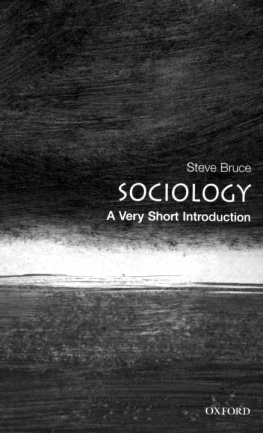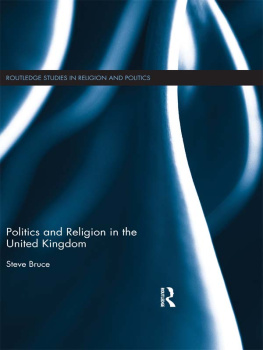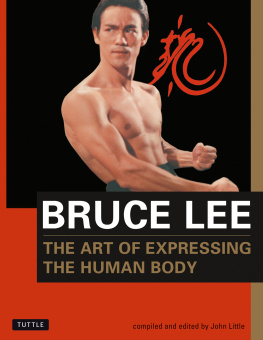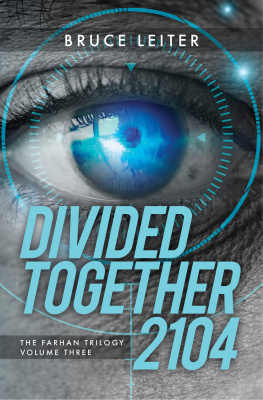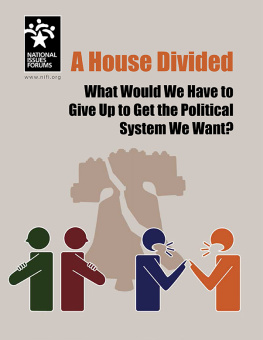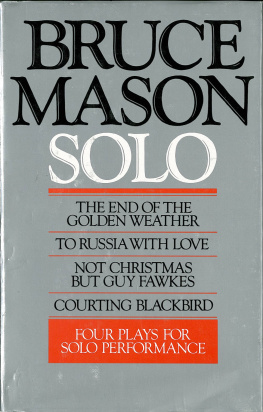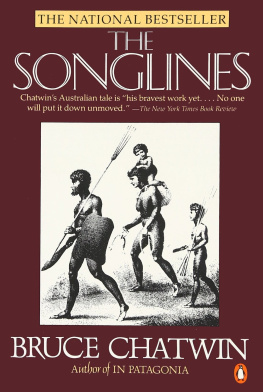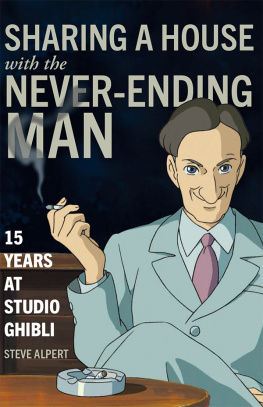ROUTLEDGE LIBRARY EDITIONS: SOCIOLOGY OF RELIGION
Volume 5
A HOUSE DIVIDED
First published in 1990 by Routledge
This edition first published in 2019
by Routledge
2 Park Square, Milton Park, Abingdon, Oxon OX14 4RN
and by Routledge
52 Vanderbilt Avenue, New York, NY 10017
Routledge is an imprint of the Taylor & Francis Group, an informa business
1990 Steve Bruce
All rights reserved. No part of this book may be reprinted or reproduced or utilised in any form or by any electronic, mechanical, or other means, now known or hereafter invented, including photocopying and recording, or in any information storage or retrieval system, without permission in writing from the publishers.
Trademark notice: Product or corporate names may be trademarks or registered trademarks, and are used only for identification and explanation without intent to infringe.
British Library Cataloguing in Publication Data
A catalogue record for this book is available from the British Library
ISBN: 978-0-367-02386-7 (Set)
ISBN: 978-0-429-02545-7 (Set) (ebk)
ISBN: 978-0-367-02526-7 (Volume 5) (hbk)
ISBN: 978-0-367-02533-5 (Volume 5) (pbk)
ISBN: 978-0-429-39905-3 (Volume 5) (ebk)
Publishers Note
The publisher has gone to great lengths to ensure the quality of this reprint but points out that some imperfections in the original copies may be apparent.
Disclaimer
The publisher has made every effort to trace copyright holders and would welcome correspondence from those they have been unable to trace.
First published 1990
by Routledge
11 New Fetter Lane, London EC4P 4EE
Simultaneously published in the USA and Canada
by Routledge a division of Routledge, Chapman and Hall, Inc.
29 West 35th Street, New York, NY 10001
1990 Steve Bruce
Laserprinted by LaserScript Ltd, Mitcham, Surrey
Printed and bound in Great Britain by Mackays of Chatham PLC, Kent
All rights reserved. No part of this book may be reprinted or reproduced or utilized in any form or by any electronic, mechanical, or other means, now known or hereafter invented, including photocopying and recording, or in any information storage or retrieval system, without permission in writing from the publishers.
British Library Cataloguing in Publication Data
Bruce, Steve
A house divided : Protestantism, Schism, and Secularization
1. Protestantism
I. Title
280.4
Library of Congress Cataloging in Publication Data
Bruce, Steve, 1954
A house divided : protestantism, schism, and secularization / Steve
Bruce
p. cm.
Bibliography: p.
Includes index.
1. Protestantism. 2. Protestant churches. 3. Sociology, Christian
4. Schism. 5. Religious tolerance Christianity. 6. Secularization
(Theology) I. Tide.
BX4817.B78 1989
280.4 dc20
89 32960 CIP
ISBN 0-415-04238-0
This book draws on a number of studies pursued over the last decade and in that time I have become indebted to a number of organizations and individuals. My research on militant Protestantism in modern Scotland was funded by the Economic and Social Research Council, my work on Ulster Protestantism was funded by the British Academy, and the Nuffield Foundation has generously allowed me to make two extended visits to the United States. I am grateful to these bodies for their assistance and I am also in the debt of The Queens University of Belfast, which has allowed me leave to pursue my research interests. I would also like to thank the Visitors of the University of Virginia for inviting me to be Scholar in Residence in the spring of 1986 and Donald J. Black and all the staff of UVAs Sociology Department for making my stay a pleasant one. Without such assistance I would not have been able to engage in the primary research which, despite the appearance of reliance on historical sources, has been a vital part of my developing understanding of conservative Protestantism.
Since he examined my doctoral thesis in 1980, Professor David Martin, recently retired from the London School of Economics, has been a helpful critic, as has Dr Bryan Wilson of All Souls College, Oxford. However, my greatest debt, as always, is to Professor Roy Wallis of The Queens University, Belfast, who has now been a friend, colleague and critic for longer than I care to remember. I would also like to thank my badminton opponent, Dr Steven Yearley, also of The Queens University, for his patience in listening to me talking endlessly about conservative Protestants.
The overall argument of this book has developed slowly and earlier working versions of some of the elements have been presented in various journals. Parts of draws on Social change and collective behaviour: the revival in eighteenth-century Ross-shire, British Journal of Sociology, 34, pp. 55472. I would like to thank the anonymous reviewers of these journals for their helpful comments on the drafts, and the journals editors and publishers for permission to draw on my earlier publications. Furthermore, parts of the overall argument were clumsily presented in Firm in the Faith: the Survival and Revival of Conservative Protestantism (1984). My justification for returning to these issues is that their presentation in the broader framework of the arguments deployed here makes their treatment far more successful, or I didnt do it very well last time.
Although most of the evidence used in this book is historical or statistical, my claim to understand Protestantism rests firmly on a decade of close involvement with the modern representatives of the beliefs here described. Although few of them would endorse the result, any merits of this work owe a lot to the patience and indulgence of large numbers of British and American liberal and conservative Protestants.
The logic of Protestantism is clearly in favour of voluntary principle, to a degree that eventually makes its sociologically unrealistic.
In the introductory description of the collection of his essays from which this quotation is taken, David Martin says: This short book contains several long books which I will never write (Martin 1978b: 1). It is my belief that the single sentence quoted contains one of those books that Martin will never write, and so I have presumed to write it for him.
The main concern of this study is the part played by Protestantism in the complex of social processes which, for brevity, we call secularization. Martins claim that Protestantism is, eventually, sociologically unrealistic, will be examined at a variety of levels and will, I hope, be sustained by a detailed presentation of the evidence. The two main themes of the book relate to the precariousness of Protestantism. The first half deals with the way in which Protestant schism and dissent paved the way for the rise of religious pluralism and toleration. The second is concerned with the fragility of the two major responses to religious pluralism: the accommodation of liberal Protestantism and the sectarian rejection of the conservative alternative.
The underlying argument of both parts is similar. I take for granted much of the conventional wisdom about the part which social, economic, and political changes played in undermining the plausibility of religion in western Europe. What has rarely been given sufficient weight, however, is the role which Protestantism inadvertently played in its own collapse. Particularly overlooked are the organizational consequences of core Reformation ideas. I do not mean the specific teachings of Protestant leaders on the proper form for the Church, although those are not without importance. I am concerned to establish the repercussions of different beliefs about authority in competing Christian traditions.



